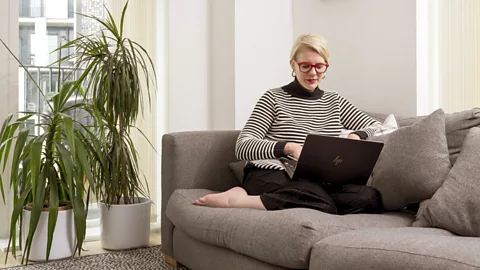Why a side-gig can be harder for women

Women are a third less likely than men to start a business – so how can we better turn ideas into success stories? Three women offer some help and advice.
This story is from an episode of Woman’s Hour presented by Jane Garvey. To listen to more episodes of Woman’s Hour from BBC Radio 4, please click here. Adapted by Sarah Keating.
Will 2018 finally be the year that you turn your pet project into a money-spinner? Sadly, for most women, this dream is less likely to become a reality. Research from UK bank NatWest found that women are a third less likely to start a business than men, with fear of failure cited as a major barrier.
So what’s stopping us?
Blogger, podcast host and writer Emma Gannon has a theory. She thinks women are going through a collective confidence crisis. “We’ve got all the tools, we’ve got a wi-fi connection, we’ve got all of these inspirational people around us, we’re seeing what other people are doing on social media all the time. But yet there’s something standing in our way.”
She says three main challenges hold them back: time, money and confidence. “I think if we can conquer those we’ll be starting more businesses.”
Otegha Uwagba is the founder of Women Who, an organisation that connects and supports women in the creative industries. She works with women who run businesses, either as side gigs or full-time.
“It’s really important to identify a niche and find something that other people aren’t doing,” she says. If you’re not doing something completely new, having a unique selling point – your spin on an existing idea – is vital. “That’s the key to your success.”
 Emma Gannon
Emma GannonWatch this space
Laura Mudie knows all too well about finding a niche. After qualifying as a nurse aged 20, she spotted a gap in the market for nurses’ wristwatches.
She noticed the standard nurse’s watch was “plain silver and very boring, and I thought, ‘well why not make this a little more fun’.” So she developed different designs with “flowers and cats and dogs and stars and pretty much everything you can think of”.
At 23, she booked a flight to China to speak to some factories about manufacturing her products and so it began.
“It was a bit mad,” she admits. “I had no education in business at all. I was very young. At that age I was fearless, I’d travelled in Asia already… it didn’t seem like such a big thing at the time. Now when I tell my story 10 years later people can’t believe it. But at the time it seemed like the natural thing to do.
“We were actually profitable in the first year which is very unusual,” she says. “I think we were lucky because the people who were buying my products were then wearing them in front of other potential customers almost on a daily basis at work.”
Turning a profit straight away isn’t the norm for a fledgling start-up, so should you only do it if you have money to lose?
Uwagba doesn’t think so. “Obviously having a safety net, maybe trying to save a bit of money beforehand can really help you when the going gets tough and, obviously, a lot of businesses aren’t profitable straight away. But I really hope that money isn’t an obstacle to women starting businesses.”
 Alamy
AlamyIf you already have a job, it’s risky to quit in order to concentrate 100% on your side earner. And don’t spend hours at work fiddling away at your personal project. It’s one of the first things Uwagba tells people trying to balance their side projects: don’t jeopardise your main job and your main source of income.
“Just try and get up early beforehand and fit in a few hours before work. That’s what I did when I was trying to get Women Who off the ground. And it’s so much more productive doing an hour or two before work and then having your evenings free than trying to come home from work and do a few extra hours.”
Emma Gannon and Otegha Uwagba share their top tips for launching your side hustle.
Show me the money
So how much money can a side hustle earn?
Gannon, whose income comes from a variety of sources including a book deal, attending events and her podcast, didn’t disclose exactly how much she makes. But, “recent studies say that you can make between £500 and £5,000 ($687-$6870) extra cash,” she says, adding that a fifth of all UK workers have a side project, so it’s a growing and desirable trend particularly among millennials.
She advises to be patient in the beginning.
“I couldn’t just quit my job. I had to have a salary, I had to get my money, I had to pay my bills, I had to pay my rent, so to start this business I needed to steal hours and minutes and days away from my job. I got to quit my job in the end but I couldn’t have done it overnight.”
Mudie has found another way to balance her work and side hustles. Employed by the National Health Service as a midwife, she works one day a week for 10 months of the year and spends the rest of the time on her two businesses manufacturing healthcare accessories – Funky Medical Accessories and Rosa and Bo.
She doesn’t necessarily need the income but her day job delivering babies not only informs her side projects, but it’s also her passion. “I enjoy the job so much it’s more of a vocation.”
Gannon says there is one myth about working for yourself that she wants to bust. “When people say ‘oh I’m going to be my own boss’ – no, you have six different bosses then. You always have a boss, it’s just that that boss might be for a day, an hour – you have clients so that doesn’t go away.”
For those fired up to start their own businesses, Uwagba has some parting words of advice: “Have some clear concrete goals in mind to motivate you and give you some direction. Even if it’s getting a new freelance client or getting a website up and running, set yourself a target, set yourself a date you want to complete it by. Tell other people so you’re kept accountable. And then just go for it.”
To comment on this story or anything else you have seen on BBC Capital, please head over to our Facebook page or message us on Twitter.
